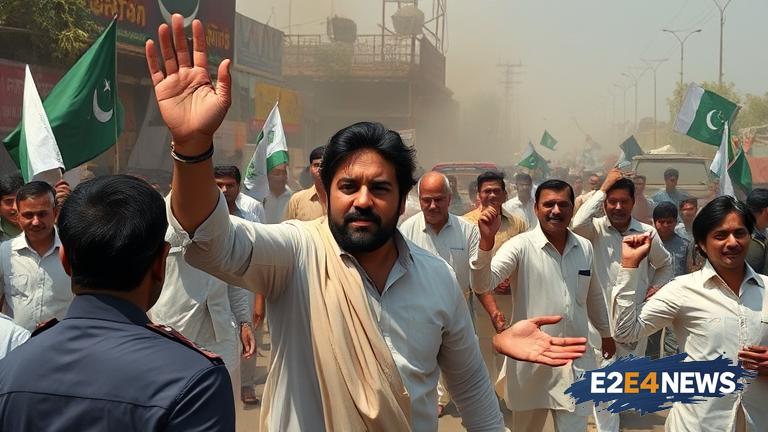Pakistan is witnessing a surge in political unrest as the Pakistan Tehreek-e-Insaf (PTI) party, led by former Prime Minister Imran Khan, has taken to the streets to protest against the current government. The protests, which began on August 5, have resulted in violent clashes between PTI supporters and law enforcement agencies, leaving several injured and many arrested. The government, in an attempt to maintain law and order, has imposed a curfew in Rawalpindi and Islamabad, but the PTI party has defied the restrictions, leading to a standoff between the two sides. The situation has been exacerbated by the imposition of Section 144, which prohibits the assembly of more than four people in a public place. Despite the restrictions, thousands of PTI supporters have gathered in the streets, chanting slogans and demanding the resignation of the government. The protests have been marked by violence, with PTI supporters clashing with police and paramilitary forces. The authorities have responded with tear gas and baton charges, leading to injuries and arrests. The PTI party has accused the government of attempting to suppress their democratic rights and has vowed to continue the protests until their demands are met. The government, on the other hand, has maintained that the protests are a threat to national security and has warned the PTI party of severe consequences if they continue to defy the law. The situation has been further complicated by the involvement of other political parties, with some opposing the PTI’s actions and others supporting their demands. The international community has also expressed concern over the situation, with many calling for calm and restraint. The Pakistani army has been deployed in the affected areas to maintain law and order, but their presence has only added to the tension. The PTI party has accused the army of siding with the government and has demanded their neutrality in the matter. The protests have also had an impact on the economy, with businesses and markets remaining closed due to the unrest. The government has announced plans to hold talks with the PTI party, but the outcome is uncertain. The situation remains volatile, with the potential for further violence and unrest. The PTI party has announced plans to continue the protests, despite the government’s warnings, and the situation is being closely monitored by the international community. The protests have highlighted the deep-seated divisions within Pakistani society and have raised questions about the country’s democratic future. The government’s response to the protests has been criticized by many, with some accusing them of using excessive force and others demanding more decisive action. The PTI party’s actions have also been questioned, with some accusing them of attempting to destabilize the government. The situation is complex and multifaceted, with many different factors at play. The outcome is uncertain, but one thing is clear: the situation in Pakistan is unlikely to return to normal anytime soon. The protests have sparked a national debate about the role of the military in politics and the limits of democratic expression. The government has faced criticism for its handling of the situation, with many accusing them of being heavy-handed. The PTI party has also faced criticism, with some accusing them of being irresponsible and provocative. The situation has raised questions about the future of Pakistani democracy and the ability of the government to maintain law and order. The international community is watching the situation closely, with many calling for calm and restraint. The Pakistani people are caught in the middle, with many facing difficulties due to the unrest. The situation is a reminder of the challenges faced by Pakistan and the need for a peaceful and democratic resolution to the crisis.



